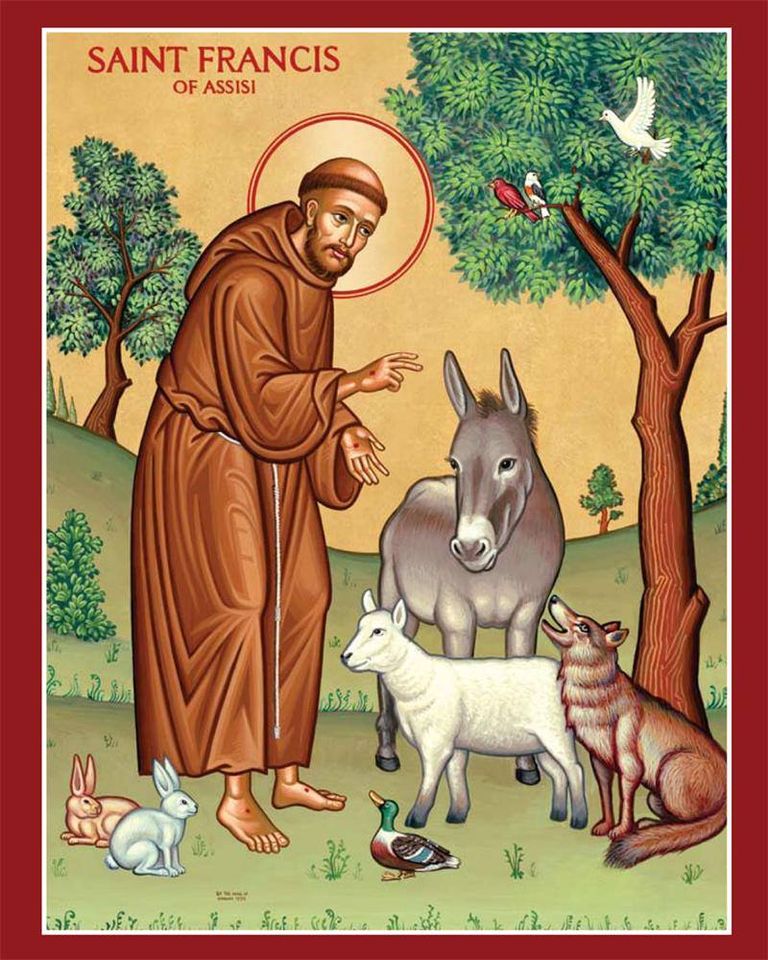|
Today is the commemoration of St. Francis of Assisi, one of the most beloved of non-Biblical saints, revered for his love of the poor and of Creation.
The son of a prosperous cloth-merchant of Assisi (located in the upper third of the “boot” of Italy, and near the center of the peninsula west-to-east), Francis was born in the late 12th century (1182). His early youth was spent in harmless revelry and aimless attempts at military glory. Various encounters with beggars and lepers pricked his conscience until he himself decided to embrace a life devoted to “Lady Poverty.” Despite his father’s intense opposition, Francis’ total renunciation of all material values, in service to the poor, was accepted by his bishop; and in 1210, Pope Innocent III confirmed his simple Rule for the Order of the Friars Minor.
The Order grew rapidly all over Europe. But by 1221, Francis had lost control of it, since his ideal of strict and absolute poverty both for individual friars and for the Order as a whole could not be maintained. His last years were spent in much suffering in both body and spirit, but his unconquerable joy never failed. Not long before his death, on October 4th, 1226, during a retreat on Mount la Verna, Francis received the stigmata, the marks of the Lord’s wounds in his own hands, feet, and sides. Pope Gregory IX, a former patron of the Order, canonized him in 1228, and began the erection of the great basilica ini Assisi where Francis is buried.
Of all the saints, Francis is the most popular and admired, but probably the least imitated: few can match his total identification with the poverty and suffering, the joy and the faith of Christ. His patronage of the poor, and his association with animals, have given a somewhat “New Age,” neo-hippie cast to his veneration in modern times. But in fact, he was quite orthodox in his faith and practice, despite his extreme asceticism, and might well have looked askance at some of those who champion him most vociferously today!
He is best known for his “Canticle of the Sun,” also known as the “Canticle of Creation,” and for what is known as the “Prayer of St. Francis” – generally attributed to him, although it does not appear in his writings, and most modern scholars believe it is not much more than a century old – both of which appear, along with his traditional Collect, below.
[Lightly edited and adapted from Lesser Feasts and Fasts 1973.]
Canticle of Creation
Most High, all-powerful, good Lord,
Thine are the praises, the glory, and the honor, and all blessing:
To Thee alone, Most High, do they belong,
and no human is worthy to mention Thy name.
Praised be Thee, my Lord, with all Thy creatures,
especially Sir Brother Sun,
Who is the day and through whom You give us light.
And he is beautiful and radiant with great splendor;
and bears a likeness of Thee, Most High One.
Praised be Thee, my Lord, through Sister Moon and the stars,
in heaven Thou didst form them clear and precious and beautiful.
Praised be Thee, my Lord, through Brother Wind,
and through the air, cloudy and serene, and every kind of weather,
through whom Thou givest sustenance to Thy creatures.
Praised be Thee, my Lord, through Sister Water,
who is very useful and humble and precious and chaste.
Praised be Thee, my Lord, through Brother Fire,
through whom Thou lightest the night,
and he is beautiful and playful and robust and strong.
Praised be Thee, my Lord, through our Sister Mother Earth,
who sustains and governs us,
and who produces various fruit with colored flowers and herbs.
Praised be Thee, my Lord,
through those who give pardon for Thy love,
and bear infirmity and tribulation.
Blessed are those who endure in peace
for by Thee, Most High, shall they be crowned.
Praised be Thee, my Lord, through our Sister Bodily Death,
from whom no one living can escape.
Woe to those who die in mortal sin!
Blessed are those whom death shall find in Thy most holy will,
for the second death shall do them no harm.
Praise and bless my Lord and give Him thanks
and serve Him with great humility. Amen.
The Prayer of St. Francis
O Lord, make me an instrument of thy peace.
Where there is hatred, let me bring love.
Where there is offence, let me bring pardon.
Where there is discord, let me bring union.
Where there is error, let me bring truth.
Where there is doubt, let me bring faith.
Where there is despair, let me bring hope.
Where there is darkness, let me bring thy light.
Where there is sadness, let me bring joy.
O Master, let me not seek as much
to be consoled as to console,
to be understood as to understand,
to be loved as to love;
for it is in giving that one receives,
it is in self-forgetting that one finds,
it is in pardoning that one is pardoned,
it is in dying that one is raised to eternal life.
Collect
Most high, almighty, and good Lord: Grant thy people grace to renounce gladly the vanities of this world, that, after the example of blessed Francis, we may for love of thee delight in all thy creatures, with perfectness of joy; through Jesus Christ our Lord. Amen.
|


